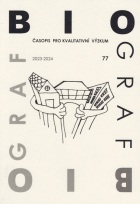
KONOPÁSEK, Z. (2023/2024): Sbohem příteli, naše cesty se rozešly: O interpretativní analýze, počítačích a programu ATLAS.ti. Biograf (77): 57-75
::::Diskutuji současné trendy v používání počítačů při analýze kvalitativních dat, zejména zavádění umělé inteligence (AI). Zaměřuji se přitom především na program ATLAS.ti. V rámci závodů, který z CAQDAS programů nabídne lepší využití AI, jsou osvědčené metodologické postupy těchto programů nenápadně, ale možná nenávratně vytlačovány technicky zaměřenými novinkami, které zatím přinášejí jen velmi nejisté výsledky. Příkladem budiž filtr úryvků podle toho, zda jsou komentované, který se nedávno z programu ATLAS.ti vytratil. Vysvětluji zásadní důležitost tohoto filtrování. Ukazuji analytický postup jako specifické praktiky čtení/psaní a kritizuji přehnaný důraz na kódování v kvalitativní analýze.
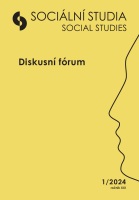
KONOPÁSEK, Z. (2024): Věda a politika, vpravo, vlevo. Sociální studia, 21 (1): 33-38. Dostupné na adrese: https://doi.org/10.5817/SOC2023-33647
::::Pavel Barša svůj text "Pragmatická sociologie emancipace: Latour vs. Boltanski" pointuje úvahami o tom, že Latourovi není blízká ani revoluční levice, ani krajní konzervatismus. Pomáhá si přitom zejména tím, že ho brání před tím, co jsem nedávno napsal o jedné Latourově knize. Podle Barši v tomto textu Latourovi vyčítám jeho politické angažmá. Kritizuji ho za příklon k levici a odkazuji ho do sféry čisté, akademické vědy. Avšak přestřelil jsem prý… Problém je v tom, že mi Barša vkládá do úst, co jsem nikdy neřekl. Latourovi jsem nikdy nevyčítal politický rozměr jeho textů. Už vůbec jsem mu nevyčítal levicovost. A rozhodně mi nejde o to ho „skolit“. Ještě bizarnější ale je, že ten, kdo mi falešně podsouvá kritiku Latoura kvůli tomu, že se ukázal jako „levičák“, mne otevřeně kritizuje kvůli tomu, že jsem se ukázal jako „pravičák“ (je to totiž právě tahle škatulka, která dle Barši vysvětluje moje omyly a mou údajnou nenávist vůči Latourovi). V textu se snažím obhájit, že cit pro jemnost a ambivalence není nic výlučně akademického a že „relativistické“ uvažování je ještě něco jiného než jen výhodné palivo pro konzervativní agendu (jak naznačuje Barša).
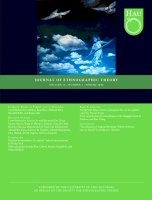
KONOPÁSEK, Z. (2022): Religion in action: How Marian apparitions may become true. HAU: Journal of Ethnographic Theory, 12 (1): 170–183
::::According to Latour, religion and science have nothing in common. The two are successful (or failing) in quite different ways. Religiousness is not aimed at fact-making, but at presence-making, he says. To critically reconsider these ideas, I discuss the case study of Marian apparitions in Litmanová. The study suggests a more complicated picture by not focusing on pure and ready-made religion, but rather on religion in the making, a kind of “almost-religion.” It shows how the reality of apparitions, initially of quite unclear status, was becoming more and more religious. Fact-making and fact-checking clearly belonged to this trajectory and have never stopped being relevant. Nonethless, together with how the apparition was progressively becoming truly religious (or religiously true), Latourian presence-making was gaining in importance.
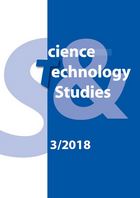
KONOPÁSEK, Z. / SONERYD, L. / SVAČINA, K. (2018): Lost in translation: Czech dialogues by Swedish design. Science & Technology Studies, 31 (3): 5-23
::::This study explores the journey of a model for stakeholder involvement called RISCOM. Originally developed within the field of radioactive waste management in Sweden, it was later used in the Czech Republic to re-establish public dialogue in the process of siting a geological repository. This case offers an opportunity to empirically study the fragility and ambiguous results of organized spread of public involvement across various domains of technological innovation and national contexts. We show how three circumstances – (1) the ambition to make RISCOM an internationally used model for public dialogue, (2) the specific situation in the Czech siting process, and (3) the short-lived and limited success of the subsequent Czech dialogues by Swedish design – were intrinsically related and sustained each other. Better understanding of such complexities might contribute to a more realistic attitude toward technologized democracy, i.e., toward practices of public deliberation increasingly becoming instrumental, transferable, and depoliticized.
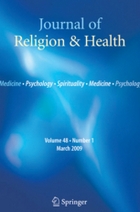
KONOPÁSEK, Z. / PALEČEK, J. (2012): Apparitions and possessions as boundary objects: An exploration into some tensions between mental health care and pastoral care. Journal of Religion and Health, 51 (3): 970-985
::::Apparitions and possessions can be taken as genuine spiritual events or as symptoms of psychopathology. We focus upon occasions when the two seemingly conflicting “interpretations” co-exist in order to explore these phenomena as a kind of boundary objects – polymorphous realities stable and graspable enough, yet belonging to different worlds at once. Related diagnostic knowledge is often uncertain and always incomplete. Yet it enables authoritative and effective professional interventions. We conclude by discussing the relevance of such a view for contemporary efforts to validate patients’ spiritual experiences within mental health care.
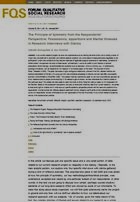
KONOPÁSEK, Z. / PALEČEK (2011): The principle of symmetry from the respondents’ perspective: Possessions, apparitions and mental illnesses in research interviews with clerics. Forum Qualitative Sozialforschung / Forum: Qualitative Social Research, 12 (1): čl. 12, http://nbn-resolving.de/urn:nbn:de:0114-fqs1101129
::::We study how experiences such as hearing the voice of the Lord or having a vision of Virgin Mary are dealt with in psychiatry and catholic pastoral practice. How the status of these phenomena is negotiated by the participants? Under what conditions they become an instance of legitimate religious experience or, alternatively, symptoms of mental illness? We approach the study of these issues “symmetrically” - we do not prefer a priori medical or spiritual explanations. Some time ago, we demonstrated and explained such an approach (which is common, e.g., in contemporary sociology of science), and its relevance for our research, in an analytic paper on the movie “The exorcism of Emily Rose” (2005). The paper discusses a highly ambiguous relationship, pictured in the film, between medical and spiritual interpretation of the story of a young girl who was considered possessed by demons and who died after unsuccessful exorcism (Konopásek & Paleček 2006). Now, the question is: can such a symmetrical approach be of any relevance also for people we are studying? In an attempt to give an answer, we have interviewed four catholic priests on this issue. The priests had been asked to watch the movie on Emily Rose and read our paper on it in preparation for the interview. Based on these discussions (and also on our current research in general), we would like to shed some light on whether and in what ways our specific epistemic perspective coheres with the views and positions of our respondents; and also, how this reflexive research experiment contributed to our own understanding of the role of the symmetry principle in our current research project.
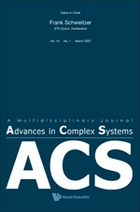
SLANINA, F. / KONOPÁSEK, Z. (2010): Eigenvector localization as a tool to study small communities in online social networks. Advances in Complex Systems, 13 (6): 699–723
::::We present and discuss a mathematical procedure for identification
of small "communities" or segments within large bipartite networks.
The procedure is based on spectral analysis of the matrix encoding
network structure. The principal tool here is localization of eigenvectors
of the matrix, by means of which the relevant network segments
become visible. We demonstrated our approach by analyzing the data
related to product reviewing on Amazon.com. We found several segments,
a kind of hybrid communities of densely interlinked reviewers
and products, which we were able to meaningfully interpret in terms of
the type and thematic categorization of reviewed items. The method
provides a complementary approach to other ways of community detection,
typically aiming at identification of large network modules.
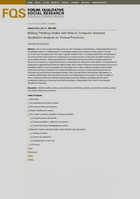
KONOPÁSEK, Z. (2008): Making thinking visible with Atlas.ti: Computer assisted qualitative analysis as textual practices. Forum Qualitative Sozialforschung / Forum: Qualitative Social Research, 9 (2): 62 odst., čl. 12. Dostupné na adrese http://nbn-resolving.de/urn:nbn:de:0114-fqs0802124
::::How is a new quality of reading, which we call "sociological understanding", created during the process of qualitative analysis? A methodological (conventional) answer to this question usually speaks of mental processes and conceptual work. This paper suggests a different view—sociological rather than methodological; or more precisely a view inspired by a contemporary sociology of science. It describes qualitative analysis as a set of material practices. Taking grounded theory methodology and the work with the computer programme Atlas.ti as an example, it is argued that thinking is inseparable from doing even in this domain. It is argued that by adopting the suggested perspective we might be better able to speak of otherwise hardly graspable processes of qualitative analysis in more accountable and instructable ways. Further, software packages would be better understood not only as "mere tools" for coding and retrieving, but also as complex virtual environments for embodied and practice-based knowledge making. Finally, grounded theory methodology might appear in a somewhat different light: when described not in terms of methodological or theoretical concepts but rather in terms of what we practically do with the analysed data, it becomes perfectly compatible with the radical constructivist, textualist, or even post-structuralist paradigms of interpretation (from which it has allegedly departed by a long way). (Reprinted from Historical Social Research 2007)
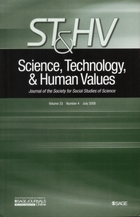
KONOPÁSEK, Z. / STÖCKELOVÁ, T. / ZAMYKALOVÁ, L. (2008): Making pure science and pure politics: On the expertise of bypass and the bypass of expertise. Science, Technology & Human Values, 33 (4): 529-553
::::This paper is based on a case study of a long-term public controversy over the construction of a highway bypass (around Plzen, Czech Republic). Two principal variants of the bypass were proposed. One of them began gradually to appear preferable, increasingly attractive for experts, but remaining only on paper. In the meantime, however, the other variant became more realistic, pushed through mainly by local politicians and actually constructed. We show how purification of science from politics (and vice versa) played a key role in the development and ending of the case. Initial expertisation of the case switched to its sharp politicization, when people got frustrated from protraction and indecisive evidence of accumulated expertise. This turned to be fatal for those who consistently staked everything on "pure facts". We conclude by outlining some general consequences of such a development for both democratic decision making and the political relevance of expertise.
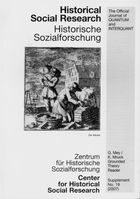
KONOPÁSEK, Z. (2007): Making thinking visible with Atlas.ti: Computer assisted qualitative analysis as textual practices. Historical Social Research, Supplement: Grounded Theory Reader (edited by Günter Mey and Katja Mruck), 19: 276-298
::::Článek se zabývá tím, jak se vlastně objevuje nová kvalita čtení, které běžně říkáme "sociologické porozumění". Vyhýbá se přitom zaužívanému metodologickému pohledu na věc, podle kterého zde hrají hlavní úlohu myšlenkové procesy a konceptuální práce. Razím zde jiný pohled, ne metodologický, ale sociologický; přesněji vzato, pohled inspirovaný současnými vědními studii (STS). Líčím kvalitativní analýzu jako soubor materiálních praktik. Na příkladu "empiricky podložené teorie" (grounded theory) a práce s počítačovým programem Atlas.ti ukazuji, že a jak je analytické uvažování neoddělitelné od praktického konání, od nejrůznějších manipulací s textem. Tvrdím, že pokud takový úhel pohledu přijmeme, lépe budeme schopni o jinak dost neuchopitelných "metodách kvalitativní analýzy" mluvit vykazatelným a návodným způsobem. Počítačové programy pro kvalitativní analýzu by z tohoto hlediska také nemusely být chápány jako "pouhé nástroje" pro kódování a vyhledávání, ale jako komplexní virtuální prostředí pro vtělené a prakticky založené poznávání. V neposlední řadě potom můžeme vidět v jiném světle i metodologii vytváření "empiricky podložené teorie": pokud ji přestaneme popisovat metodologicky-teoreticky, ale spíš jako postupy, jimiž praktického zacházení s texty dat, stane se tato údajně konzervativní a beznadějně moderní metodologická škola krásně slučitelná s radikálním konstruktivismem či post-strukturalismem.
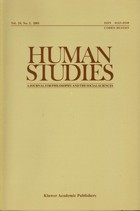
KONOPÁSEK, Z. / KUSÁ, Z. (2006): Political screenings as trials of strength: Making the communist power/lessness real. Human Studies, 29 (3): 341-362
::::In this paper we discuss the problem of communist power in so called totalitarian regimes. Inspired by strategies of explanation in contemporary science studies and by the ethnomethodological conception of social order, we suggest that the power of communists is not to be taken as an unproblematic source of explanation; rather, we take this power as something that is itself in need of being explained. We study personal narratives on political screenings that took place in Czechoslovakia in 1970 and analyze how the power of communists obtained its strength from ordinary and “unremarkable” interactions between participants. The screenings are interpreted, in the terms of Bruno Latour, as “trials of strength.” We show that it was crucial for all the participants that associations, translations or mobilizations involved in making the regime real, remained partial and multiple, and not exclusive and “total” as is often assumed within dominant discourses on totalitarianism.
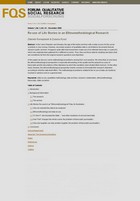
KONOPÁSEK, Z. / KUSÁ, Z. (2000): Re-use of life stories in an ethnomethodological research. Forum Qualitative Sozialforschung / Forum: Qualitative Social Research, 1 (3): 42 odst, čl. 24. Dostupné na adrese http://nbn-resolving.de/urn:nbn:de:0114-fqs0003248
::::In the Czech Republic and Slovakia, the age of life history archives with a wider access for the social scientists is only coming. However, secondary analysis of qualitative data is not limited to documents that are stored in public archives. It happens quite often that researchers make use of an interview transcript, or a part of it, which has originally been gathered for a different occasion. Thus, they use these data for studying new topics that are sometimes far from the original research questions and objectives. In this paper we discuss some methodological problems arising from such practice. We show that, on one hand, the ethnomethodological perspective is especially demanding on the quality and the pinpoint accuracy of transcripts and the descriptions of the interviews by which the narratives were elicited (field memos). On the other hand, however, the ethnomethodological perspective orients scholars to formulate their research objectives according to what the data itself offers. The methodological problems related to the re-use of data can hardly be resolved in advance and on a general level.
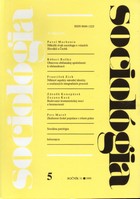
KONOPÁSEK, Z. / KUSÁ, Z. (1999): Budovanie komunistickej moci a bezmocnosti. Sociológia, 31 (5): 459-480
::::This paper turns attention to the period of state socialism. Its aim is to suggest and illustrate a theoretical and analytical framework for making the communists" power problematic from sociological point of view. We would like to promote such a perspective in which the power of communists is not taken - explicitly or implicitly - as something that explains the logic of life under the communist regime; rather, on the contrary, we present it as something that needs to be explained. As such, our approach is inspired by contemporary sociology of science, above all by authors such as Bruno Latour and John Law whose effort is in many respects similar to ours. After a theoretical outline of the approach, we perform its modest practical illustration. We use short extracts from two biographical narratives for an analysis of one particular situation in which the communist power played an important role: the political screenings that followed the military invasion into Czechoslovakia at the end of so called Prague Spring. The screenings are interpreted, in this analytical sketch, as "trials of strength" as well as "real transformations" both of the communist regime itself and all its actors. Above all, we focus on the moments when somebody or something was transformed into a fulcrum, an indisputable and stable entity, or, on the other hand, into a questionable, not-quite-real, because negotiable and reversible network of relations. These moments help us to show the heterogeneous and often surprisingly subtle sources of the political power that constituted state socialism and made it durable.
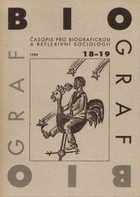
KONOPÁSEK, Z. (1999): Od Černé knihy k černé skříňce: komunismus relativizujícíma očima. Biograf (18-19): 3-24
(18-19): 3-24
::::This paper proposes a sociology of state socialism. It does so by discussing the place of state socialism within the debates on modernity and postmodernity and reassessing the possibilities of so-called biographical research in the field of post-communist studies. The paper also outlines a theoretical and analytical framework for making the communists[a] power problematic from a sociological point of view. Such a perspective suggests that the power of the communists is not taken - explicitly or implicitly - as something that naturally explains the logic of life under the communist regime; on the contrary, it is presented as something that needs to be explained. As such, this approach is inspired by contemporary sociology of science, particularly by the work of Bruno Latour. In doing so, the paper hopes to achieve one important side-effect, namely to (re)establish the phenomena of state socialism as a topic worthy of general sociological attention.
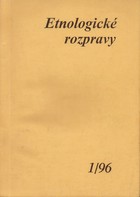
KONOPÁSEK, Z. (1996): Radikální reflexivita a biografický přístup. Etnologické rozpravy, 3 (1): 49-62
:::: 
 ? - recenze vyjde v časopise Biograf
? - recenze vyjde v časopise Biograf
 se objevily informace o tom, co lze snad prý během března čekat v nové, sedmé verzi mého oblíbeného analytického programu
se objevily informace o tom, co lze snad prý během března čekat v nové, sedmé verzi mého oblíbeného analytického programu














